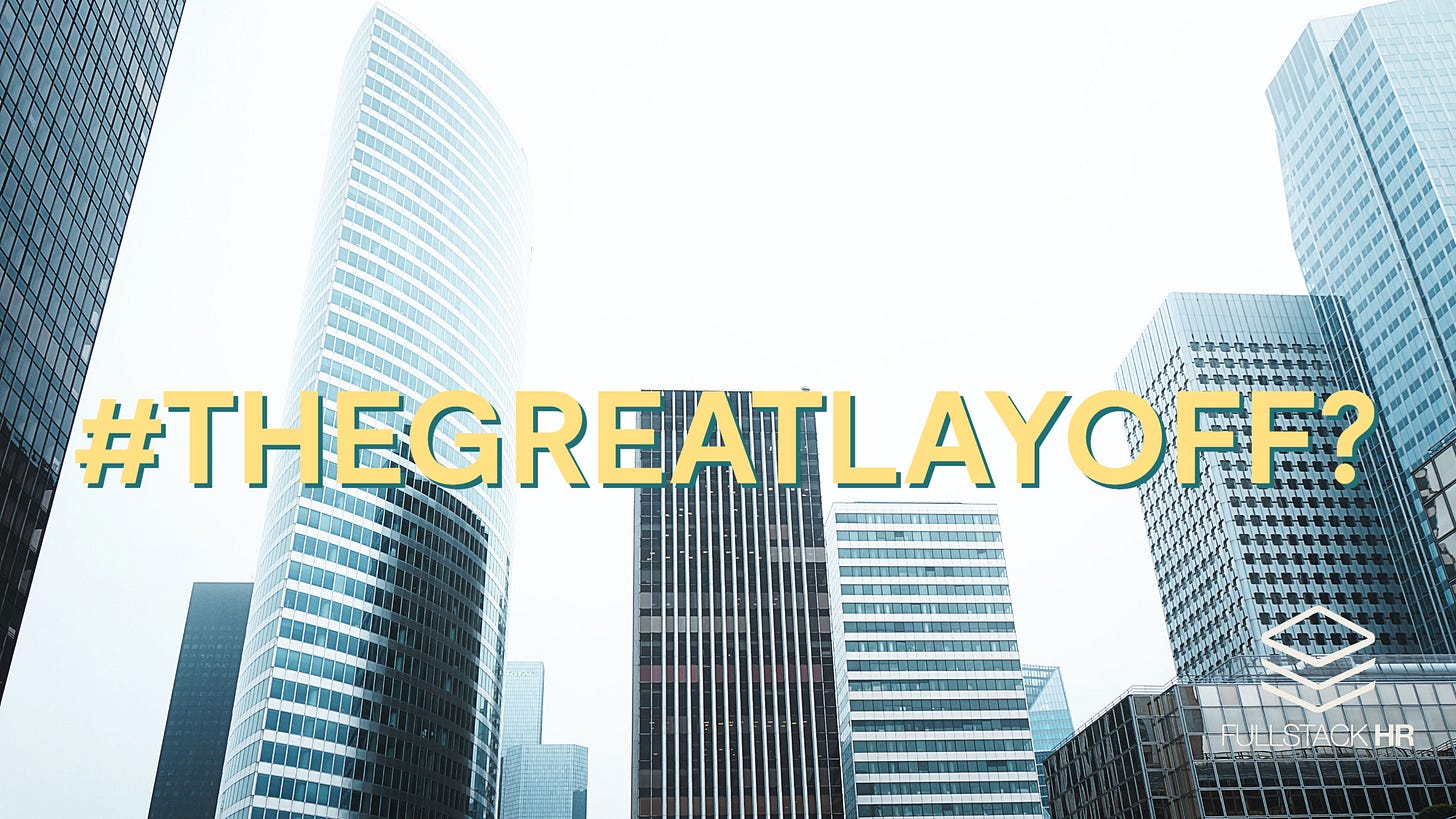The Great Layoff?
Are we entering a new phase?
Welcome to Fullstack HR!
If you aren't yet subscribed, join the other 1500+ readers on the free newsletter by subscribing below.
Listen to the episode on Spotify or Apple Podcast.
Happy Thursday!
Last week was Ascension day, which in Sweden means a long weekend for many people, so I didn’t send this out; instead, I’m dropping it now.
I started writing this piece three weeks ago when Carvana did their layoffs; I’ve been trying, as always, to look for the HR angle on all of this news.
And not the “how do we do layoffs-angle”; I’ve partially already covered that.
(Hint; most executives didn’t read my tips…)
After The Great Resignation comes The Great Layoff?
Over the last months, we've seen an uptick in tech companies doing layoffs or restructuring their teams during the last couple of weeks. Robinhood is letting people go, Netflix reduces its staff, Meta pauses their recruitment efforts in certain areas, and Cameo reduces their staff. And while writing this, Swedish company Klarna announced that they would reduce their team by 10%.
Despite that, we still see strong demand for almost all kinds of talent in the market. It's interesting to read why these companies are laying people off. Because there's one common theme across nearly everything, I've read about why these layoffs or pauses are happening.
I'll get back to that.
Let me first recognize that being laid off sucks. It truly does. If these changes have impacted you, I hope you'll land on your feet and come out on the other end. But this text will take the company perspective; bear that in mind.
Why are these layoffs happening?
There are serval contributing factors and one common theme, which I pinky promise to get back to.
Overarching macroeconomic events play one part, with uncertainty in the market driven by the war in Ukraine, supply chain issues, and post-pandemic blues when the world normalizes. That latter affects companies such as Netflix and Robinhood, which saw a significant uptick in customers due to the pandemic. When the world normalizes, we choose to spend our money on other things, negatively impacting the companies that benefited from us all sitting at home.
And yes, this is a simplified version of the reasons behind this all; I'm an HR dude, not a national economics dude.
The exact microeconomic reasons vary from company to company, and there might be specific factors. Still, if I were to cover all these factors, I'd have to become an economics person, and I quite like being in HR.
So let's get back to my HR angle and that one thing that caught my eye while reading about all of this.
It's about realignment.
It seems like many (not all) of these companies have grown significantly over the past year(s) and that they've used the good old "let's throw more people at the problem" solution, and now they have some catching up to do when it comes to how they structure their teams. It's not that they state this explicitly, and this is, once again, not the full explanation, but from the outside, it seems like this is one part contributing to the layoffs we now see.
Having spent the lion's share of my career in startups and scale-ups, I know this is a common practice. For many managers, it's been easier to hire yet another person versus having to challenge the team on their ways of working.
We need to be close to the business - challenging them, growing them, and pushing them to be better at organizing...well, work in general. That means helping out with all aspects of talent management. Not only nodding when they say they want to hire more people but actively questioning how we are currently structuring how they work.
I'm not saying that all of these companies did a poor job or neglected this part because I don't know that. As said, there could be many and various reasons why companies ended up here.
I know that if you work closely with the business, working hand-in-hand and constantly improving who does what in a team, how the team works together, and how the group operates, you will be better off should anything happen. And yes, unfortunately, one part of our job is sometimes to let people go, but it's always important to do that in the best possible way.
The #greatlayoff serves as a good (and unfortunate) reminder that we are needed in our organizations. We must dare to challenge our ways of working. We must dare to give our perspective on organizational matters. We must dare to have a long-term, holistic view of how to create, foster, and grow organizations.
And unsurprisingly, my view is that doing excellent HR work has never been more critical than now.
But as always, I’m HR biased.
What’s your perspective?


